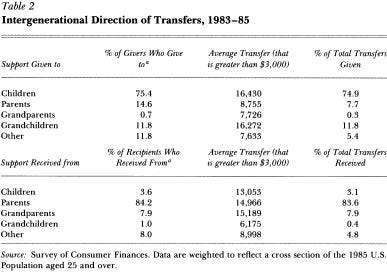Family, Transfers, Pride, and Shame
Contrary to popular belief, the elderly financially support their kids, rather than the other way around. This was true in hunter-gatherer and peasant societies. A neat piece in the JEP shows that it was also true in the U.S. in the 1980s. Using the Survey of Consumer Finances for 1983-5, the authors look at who gave and who received gifts of $3000 or more. Survey says:

Donors and recipients agree: Money flows from old to young. According to donors, parent–>child giving is almost ten times as big as child–>parent giving. According to recipients, parent–>child giving is over twenty five times as big as child–> parent giving.
Scholars in this area often say that people exaggerate how much money they give. But that’s not quite what we see in the data. For child–>parent transfers, reported giving is much larger than reported receiving. For parent–>child transfers, however, the pattern reverses: Recipients say they got more than donors claim to have given. In each case there is roughly a 10 percentage-point discrepancy.
This could just be sampling error, but I’m tempted to interpret. It looks like older people feel a bit embarrassed to either subsidize their adult children, or accept their kids’ charity. Younger people, in contrast, feel better about both helping and receiving help from their parents.
When I mentioned this to Alex Tabarrok, he observed that parents are proud to put their kids through college. That sounds right to me. But in terms of stigma, there’s a world of difference between paying your son’s tuition and helping a grown man pay his bills.
The post appeared first on Econlib.

